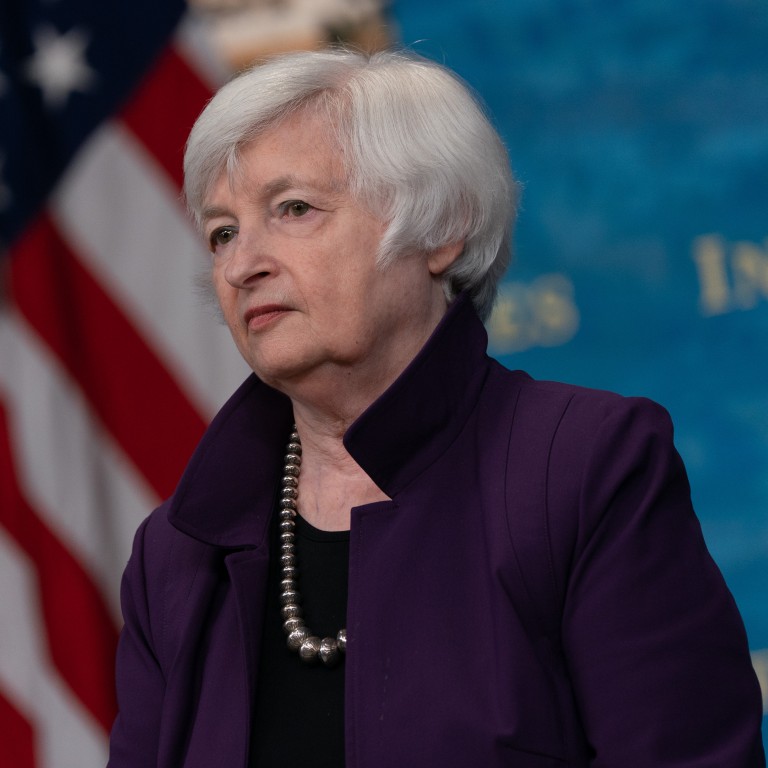
Restrictions are needed but full US-China tech decoupling isn’t wise, US Treasury Secretary Janet Yellen says
- ‘If we are too broad in our policies we can lose the benefits that come from having globally integrated technology systems,’ she tells US lawmakers
- Yellen also says she hopes China will join in G7 plan for minimum global corporate tax rate
The United States needs to curb China’s harmful acquisitions and restrict American investment in some Chinese firms to protect its national security, but a complete severing of technological ties would be worrisome, US Treasury Secretary Janet Yellen told lawmakers on Wednesday.
“China is our most serious competitor and it poses challenges to our security and our democratic values,” said Yellen, who testified before the Senate Finance Committee.
“We’re looking at the full range of tools that we have to push back to redress practices that harm us [and our] national security and our broader economic interests,” she said.
For example, she said, the Committee on Foreign Investment in the US (CFIUS), a Treasury-led inter-agency body, has helped rein in Chinese acquisitions that would have allowed access to advanced American technology.
But she said she “would worry somewhat about complete technological decoupling,” noting that many US allies in Europe, for example, would be reluctant to completely cut off their business activities in China.
“If we are too broad in our policies in terms of how we approach this, we can lose the benefits that come from having globally integrated technology systems where advances in one country benefit countries worldwide,” she said.
Yellen’s Treasury Department, beyond its leading role in reviewing Chinese mergers and acquisitions in the US, has also been given new authority to identify and maintain a list of companies with Chinese military backing. American investors are restricted from these firms, known as Chinese Military-Industrial Complex Companies, to prevent US capital from helping develop China’s military.
US Senate passes broad US$250 billion legislation to counter and compete with China
Yellen’s remarks on Wednesday came a week after sweeping legislation to earmark more than US$250 billion in funding for tech research, development and manufacturing passed in the US Senate.
The House of Representatives is considering its own bill, the Eagle Act, to counter Beijing, though its prospects are uncertain.
In the Senate bill, as much as US$52 billion would be spent to bring semiconductor manufacturing back to the United States and make it less dependent on foreign countries.
The US has begun expanding chip production, attracting the Taiwan Semiconductor Manufacturing Corp (TSMC), a global giant in the field, to build a plant in Arizona.
A report released last week on US supply chains, which studied imports of semiconductors, pharmaceuticals, automobile batteries and rare earth elements, said: “China stands out for its aggressive use of measures – many of which are well outside globally accepted fair trading practices.”
In addressing the dangers of a complete tech decoupling on Wednesday, Yellen said: “The globe has benefited substantially from spillovers of technological developments in one place to other places.
“I would worry about a decoupled global system. Many of our allies would be very reluctant to all but do business in China. This is a difficult issue.”
China urged to join global minimum tax regime, as Hong Kong says it may be ‘restrained’ by new rules
She also addressed the global minimum tax plan endorsed by G7 leaders on Sunday, which would impose a minimum corporate tax rate of 15 per cent.
Some countries including China are hesitant to give up tax incentives to help advance policy priorities such as encouraging R&D and attracting foreign investment.
“I would not agree to any type of carve-out that would meaningfully weaken a robust global minimum tax regime, not for China and not for other countries. We want this to work and not be filled with loopholes,” Yellen said.
“We continue to work to try to bring China into this agreement. Other countries are doing the same,” she said. “I’m hopeful China will decide it’s in their interest to join this agreement.”


